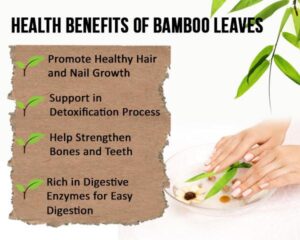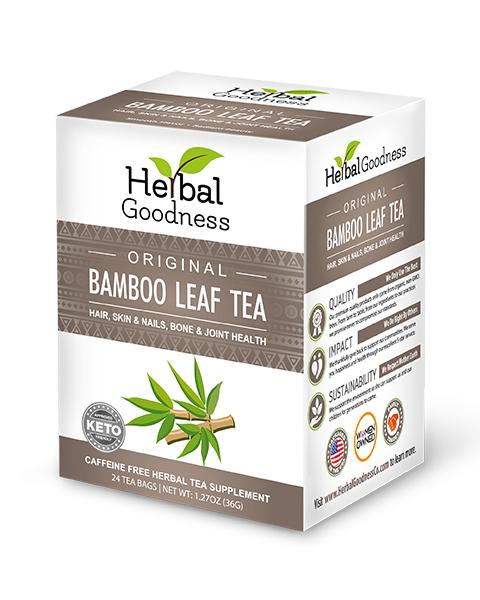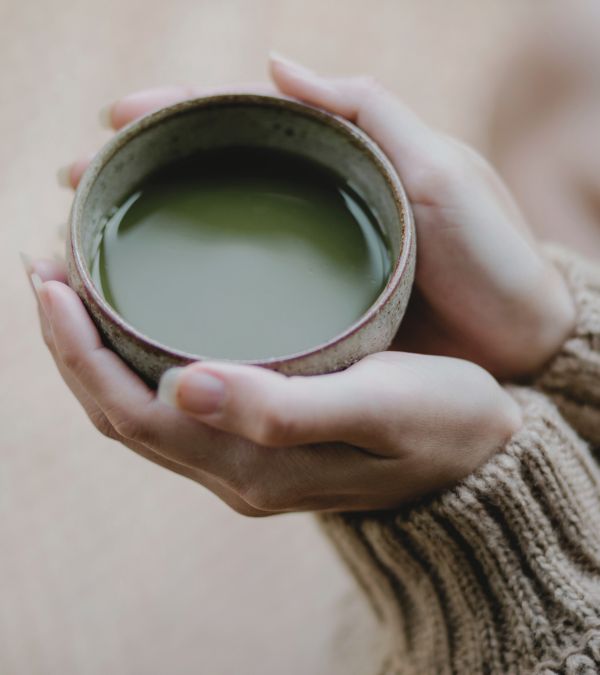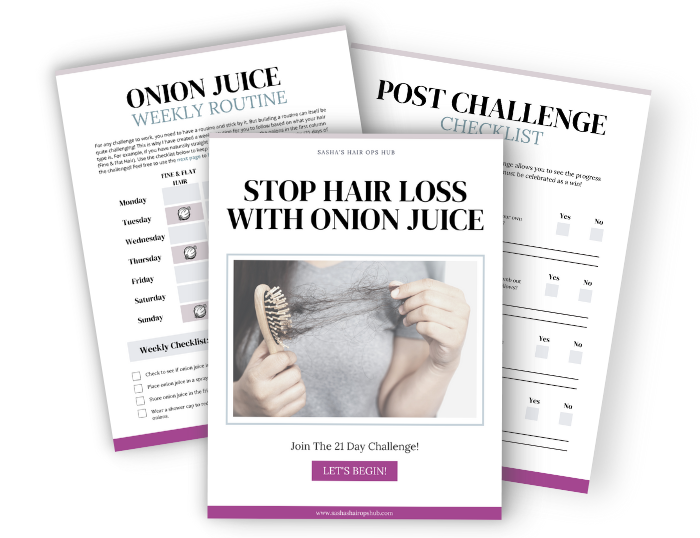Being a plant parent, I have always been fascinated with the bamboo plant and its limitless uses and health benefits. Aside from being the fastest growing plant in the world, bamboo can be used as a building material to make household goods, furniture, clothing, and is even used in beauty products.
For many centuries, drinking bamboo tea for hair growth has been widely popular amongst most people in Asian countries.
Yes, you read that right; bamboo tea and hair growth in the same sentence!
Bamboo tea can help your hair in more ways than you can imagine. In this article, we will be discussing the hair and health benefits of drinking bamboo tea, how you can make it yourself and where you can buy it.
Bamboo Tea For Hair Growth
When it comes to herbs, bamboo is not a popular choice here in the western world, nor are the benefits widely known here.
But people in China have been drinking bamboo tea for centuries! In India, people have been using this tea as an Ayurvedic remedy to beautify their skin, nails, and hair.
I recently discovered the tea myself when I was looking for what kinds of herbs help with faster hair growth. Having done extensive research, I began drinking it daily and fell in love with the taste and what it did for my hair over time (more on this later).
So, what is this tea, what is so special about it and how does it help hair?
What is Bamboo Tea?
Bamboo tea is made from the leaves of the bamboo plant. These leaves are handpicked, washed, dried and then ground to make bamboo leaf tea (Note: I will use the term bamboo leaf tea and bamboo tea interchangeably).
What Makes Bamboo Tea Special For Hair?
Bamboo leaves contain the highest levels of naturally occurring silica than any other plant in the world!
Here’s a reference to consider: bamboo leaves contain as much as 70% silica and this is ten times more silica found in the herbs, horsetail and stinging nettle!
Silica is super important for hair because human hair is actually made up of 40% silica (one gram of each hair strand has 90 micrograms of silica). This mineral helps deliver essential nutrients to the hair follicles, promoting strong hair.
More importantly, it is a building block for collagen production. Collagen plays a pivotal role in enhancing the elasticity of our skin and hair.
Not only does bamboo tea have a rich silica content, but it also contains other hair-healthy micronutrients worth mentioning. These are Vitamin C, folic acid, thiamine, riboflavin, niacin, pantothenic acid, and pyridoxine – all of which help with healthy hair growth.
Hair Benefits of Bamboo Tea
Bamboo tea has been a tried-and tested method of improving hair. Many people who have tried it have noticed positive results within just a month of drinking the tea regularly.
Here are four hair benefits of incorporating bamboo tea in your daily diet:
1. Stronger & Thicker Hair
Silica found in bamboo tea can help improve hair elasticity and strength because of its ability to produce collagen. Collagen is a protein naturally produced by the body but this production declines as we age. Bamboo tea is an excellent way to get the silica needed to encourage strong and thicker hair growth.
Besides, human hair is made up of protein and protein deficiency in the body leads to weak and fine hair. Upping your intake of silica ensures hair strands are stronger and thicker. Along with silica, bamboo tea also has essential vitamins that further help this process!
2. Reduced Hair Shedding
As alarming as it is, excessive hair shedding or thinning can be caused by several factors including stress and hormonal changes. Bamboo tea helps to relieve stress & anxiety, prolongs happiness & health, and preserves Chi energy, which is the energy of life itself (i.e. balance between Yin & Yang)!
Bamboo tea also helps to reduce blood pressure levels, thanks to its high potassium content.
While there is no scientific evidence that claims silica found in bamboo can reverse hair loss, drinking bamboo tea has been proven to reduce hair thinning (more on this coming up).
3. Increased Hair Growth
Essential vitamins, minerals, and antioxidants are necessary for healthy hair growth. Oftentimes, our body becomes deficient in either of these nutrients that then halts new hair from growing.
The many vitamins and minerals found in bamboo tea are an excellent source of providing the hair with the nutrients it needs to grow healthy and long.
Bamboo tea also helps in detoxifying the body so that toxins are removed and inflammation anywhere in the body is reduced. This is beneficial to the hair follicles as they remain healthy and can boost new hair growth.
4. Improved Hair Texture
Bamboo is commonly used all over the world in hair products, especially by Korean cosmetologists, to strengthen and improve the structure of hair. It is a widely used moisturizing agent that helps fight off signs of aging and adds hydration back to dry and brittle hair.
Free radicals attack and destroy the hair shafts, making it weak and causing hair breakage to occur. This makes hair frizzy and damaged-looking. The antioxidants in bamboo tea aid in removing these free radicals from hair, improving hair texture, shine, and health.
Scientific Proof of Silica For Hair
Silica and its effect on hair has been studied by many researchers. A study published in 2007 found that fine hair was strengthened in 48 women who took 10mg of silica for a period of 9 months.
A more recent study published in 2012 assessed silica as an oral supplement on hair density and growth in women with hair thinning.
The findings of this study stated that the supplement successfully increased hair volume, thickness, and growth after 90 days as well as 180 days of additional treatment, suggesting that continued improvements are highly likely with ongoing treatment.
The oral supplement used in this study was Viviscal® Maximum Strength that contains an organic form of silica derived from horsetail along with vitamin C and other hair-healthy nutrients.
Bamboo Tea Health Benefits

Besides all this scientific evidence for hair growth, bamboo tea works wonders for our health in even more ways.
It is no secret that herbal teas have medicinal properties, and bamboo tea is no different. If you would like to know other teas that help with hair, check out my article on herbal teas for hair growth.
For now, let us get back to the health benefits of drinking bamboo tea.
Provides Digestive Support: Bamboo tea contains around 4% fiber. This amount of fiber intake balances out digestive problems like bloating, gas, indigestion, etc.
Boosts Immunity: The antioxidants in bamboo tea provide a stronger immune response to cold and flu symptoms.
Promotes Weight Loss: Bamboo tea stops the body absorbing fat from food, helps to ease out food cravings and has zero calories. This helps to achieve your weight loss goals.
Stronger Nails & Smoother Skin: by drinking bamboo tea regularly, skin is more elastic and firmer; nails are stronger and they break less often.
Improves Bone Density: The bones in our body and our teeth are made up of silica, which gets depleted as we age. Bamboo tea helps to restore silica levels to make bones and teeth stronger.
Bamboo Tea Lookouts
Our bones, teeth, skin and hair all contain silica. However, as we age our body produces less and less of the vital mineral. Consuming foods like bananas, whole grain breads, and bran cereals is a great way to increase silica in the body. A better way to increase these levels in your body is by drinking bamboo tea!
It is highly unlikely for bamboo tea to cause any adverse reactions when consumed in moderation. However, it is advised to avoid taking the tea if you are pregnant or breastfeeding, not because the tea is harmful but because there is a lack of research to confirm whether it is safe for this group of women.
Also, people with thyroid issues are advised to avoid drinking bamboo tea as prolonged consumption may worsen their conditions.
Always check for allergies before you try out herbal tea for the first time and always consult with your doctor if bamboo tea is safe for you before you begin.
How To Make Bamboo Tea
Making bamboo leaf tea is as simple as making any other herbal tea. If you are using a teabag, I would highly recommend you follow the instructions it came with to achieve the best flavor.
Otherwise, here is a simple and quick way to make your own bamboo tea at home.
Directions:
- Boil 2 cups of water in a kettle or stove
- Add 2 tablespoons of dried bamboo leaves or 1 tea bag to a teapot
- Pour the hot water into the teapot
- Allow to steep/infuse for at least 5 minutes
- Strain the leaves before pouring into a cup
Your bamboo tea is ready to be enjoyed! Feel free to add raw honey for sweetness or lemon for freshness.
Herbal Tea Blend Ideas
In case you are anything like me and you love to experience different kinds of flavors, you can do so with bamboo tea as well. The tea blends easily with other herbs and flavors. Here are a few popular blend ideas that you can try with your bamboo tea to get even more hair benefits:
Moringa is loaded with powerful vitamins and active amino acids that provide the hair with much-needed nutrition. Mint contains essential oils that have a healing effect on skin, hair & even nails. Also, adding mint to the tea can help with digestive issues and also cure bad breath!
Blending green tea with bamboo tea provides immense health benefits like reducing inflammation in the body, balancing out blood sugars, and even boosting moods- it works as a natural stimulant! This is because green tea is filled with theophylline and theobromine -both work the same as caffeine.
Lemon Ginger
Ginger and lemon are loaded with antioxidants and provide relief from headaches, pain, and muscle soreness after a busy day. It improves cognition, cures fevers, and builds immunity. Ginger is best in treating throat issues and even works wonders getting rid of the sniffles!
Bamboo Leaf Extract
If you are not a fan of herbal teas, there are other ways to consume silica from bamboo. You can have bamboo leaf extract in powder, liquid extract or even as a supplement in capsule form.
Powdered bamboo can be used over your favorite salads, while a few drops of bamboo leaf liquid extract can be added to your favorite green smoothies for hair. Alternatively, you can take a bamboo leaf supplement as a capsule with your meal.
Where To Buy Bamboo Tea
You may be able to easily find bamboo leaf teas in your local Asian supermarkets.
However, I have noticed that they aren’t always 100% organic even if they say they are on the box!
Be sure to always check the ingredients and do your due diligence in researching how the leaves are cultivated.
Here is what I trust and highly recommend:
Herbal Goodness | Bamboo Leaf Tea, 24 Tea Bags

1.5 oz (1.5 g)
$11.95 USD
It is a great value-for-money deal that I have come across as you get 24 tea bags that are purely and organically made out of bamboo leaves that taste natural and flavorful to the last drop! It is also priced affordably, considering that you could get more than one cup out of one tea bag.
However, you can save an additional 5% if you use my discount code HERBALFARM5 at checkout!
The best part of all is that the company is 100% woman-owned and it sends 10% of their profits to educate impoverished young girls in Africa. You can check out my detailed Herbal Goodness Brand Review on the company I did here to know more about them-
How Often To Consume
There is really no strict rule or limit as to how many times you should drink bamboo tea in a day. It is merely a matter of personal preference and what you think works best for you.
Having that said, it is recommended to drink one to three cups of bamboo tea daily for at least a month in order to see noticeable results in your hair.
My Results
Personally, I drank around 2 cups of bamboo leaf tea daily and didn’t really notice much of a difference in my hair in the first month. The change must have been happening but it was too insignificant for me to relate it to the tea I was drinking.
It was only when I was close to four months in and ran out of my bamboo leaf tea supply that I started to notice my hair getting dry & brittle.
That is when I realized that the tea was working all this time!
I quickly re-ordered and got back on it and noticed that my hair quality started to improve and so did my nails. Both were stronger and grew faster!
But of course, it wasn’t just the tea that was improving my hair growth. I was also drinking a lot of green smoothies, doing regular yoga and using natural or organic hair care methods where I possibly could.
Future Lookouts
Herbal teas can do wonders for your overall health and well being and now you also know that drinking bamboo tea for hair growth really works. At least it did for me and a whole bunch of other people in most of Asia!
Even if you are not looking to improve your hair, you can still benefit from consuming bamboo tea on the regular due to its silica-rich content and healthy vitamins and minerals.
Although some people prefer to drink herbal teas most in the fall and winter months, I personally really enjoy them all throughout the year.
Will you give bamboo tea a try after reading all that it can do for your health?
Do let me know your thoughts below as to which blend you are most interested to try out!





16 Responses
Hi Sasha
I loved reading about bamboo tea and what it can do for someone like me.
I have extremely thin hair that breaks very easily. So, if I drink this tea, hopefully, I will see an improvement in the strength of my hair.
Great Post. I must get some tea and try it out.
Hey Yvonne!! Yes, the tea could help you strengthen your hair but keep in mind it is a slow and long process. Are you also stimulating your scalp with oils and massages? That can also help but since you mentioned your hair breaks easily, I would really suggest to be gentle while massaging. Hope this helps! Lemme know if you have more concerns!
Hey,
WOW! I have been bald since I was 17 years old (I am 38 now). If I knew that there was tea that could help you to grow your hair back, then I would have been drinking it forever 🙂
My whole family are bald (only the men), so I am going to share this article with ALL of them. Let’s see if we can make some of this tea and see what happens. I will let you know if my hair starts to grow back.
Thank you for sharing and keep up the great work.
All the best,
Tom
Hey Tom, just to reiterate, teas can’t really reverse hair loss! But you can surely get a whole lot of other health benefits from them! If all the men in your family are bald, that could be genetics-related. But hey, think of all the money you save on no hair products!! 🙂
Hi Sasha,
Thanks for sharing this article. Now, I know that Bamboo tea is good for hair and has many other benefits. I love the idea of blending it with other tea options to add more flavor and bring more hair benefits. Among all options, I prefer lemon ginger. My whole family love ginger tea and drink it in our daily life. Blending it with Bamboo tea is easy and feels like we all benefit from things we are doing already. 🙂
Cheers,
Matt
I love lemon and ginger too! it gives tea an extra kick and it usually is my go to tea in the fall season. Do give bamboo tea a try and im sure you will love the blend too! 🙂
So this may sound like a crazy question, but would this be ok for dogs?
That really is a CRAZY question haha!! Honestly, I have no idea either. I don’t own a dog (as much as I would love to) but even still, I don’t even know if dogs actually drink tea?!
This is incredible timing! It’s now been one year since my last haircut and I’ve chosen to grow out my hair. I’m concerned about how many strands come out when I shower or have tangles. There’s so much I don’t know about this, and it’s pretty overwhelming at times.
I’ve started doing deep cleans of my hair daily (I’m now doing a thorough cleaning once a week, and that’s as much oil buildup I can stand before I start to feel gross.
But making what hair I continue to grow more resilient AND I get to drink tea at the same time? Heck yes, thank you for this!
Love that you are taking care of your hair health! (virtual) High five on that! 🙂
It was fun to read about bamboo tea. I’ve never actually heard about it but it makes a lot of sense when you see how healthy and what lovely hair Asian women have. I’m ready to give it a go as my hair is definitely thinning as I age and menopause hasn’t helped. It will be nice to see how it tastes and add something new to my health management plan. I enjoy herbal teas. Thanks for all the great information.
The quality of our hair really does change as we age, no doubt! But there are things we can do to offset that change and drinking tea is one of them! If you already enjoy herbal teas, you will love bamboo tea as well! Do give it a try and let me know if you have any questions 🙂
You can drink bamboo, like you said all we know of it is that we can build with it and be well structured, but you can drink this, and has many benefits behind it. We did not know that bamboo can be used for many things and one being healthy inflammation of the body and balancing blood sugars.
Amazed of what bamboo tea can do for your body this has to be told to everyone, we are going to spread the word this is what others are looking for to grow your hair as well.
We take real good care of our hair and with the summer it is getting brittle and dry and needs to be moist well this bamboo green tea seems to amaze me and catch my eye.
Bamboo is an amazing plant and I am curious to know how it will taste. I am buying from the link you provided- thank you so much!
Cheers,
Mathew&Deloris
it tastes very similar to green tea! If you are a fan of green tea, you will enjoy bamboo tea as well. You can always add honey or fresh lemon to suit your tastebuds! 🙂
Hello Sasha
I always say if anything has to change and you do it with a natural remedy or any other thing that doesn’t have any harmful chemicals, i am all for it.
It is great to learn that bamboo has so many helpful ingredients, especially when it comes to achieving healthy, long, and thick hair. I like the fact that this method has been tried and tested by you, meaning its safe and that it works.
I also like the fact that this can help both male and female grow their hair and possibly solve any hair problem they would like to.
I have seen bamboo plants everywhere and never did I once think that this plant can help with hair too!
Great article!
This is true, Femi- not many people know how bamboo can also help with hair. I am glad to read that you have enjoyed my article! 🙂